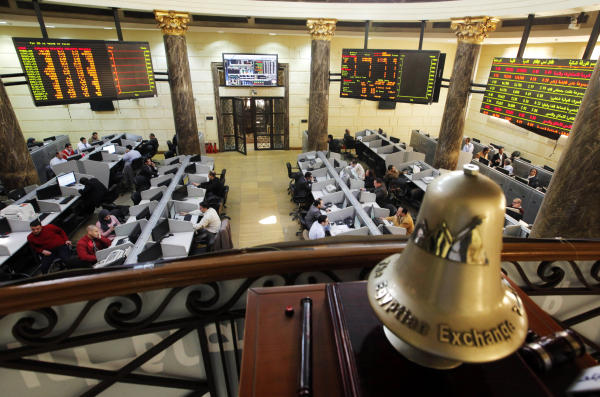
In this Saturday, March 10, 2013 file photo, Egyptian traders work on the floor of the stock market in Cairo, Egypt. (AP Photo/Amr Nabil, File)
Cairo, Asharq Al-Awsat—The Egyptian government has taken measures to ease some of the provisions from a new stock market tax law announced last week after the Egyptian Exchange (EGX) recorded its biggest daily drop in almost a year on Sunday following the announcement.
The law, which imposes a 10-percent year-end tax on stock market dividends and capital gains, was announced on Thursday by Finance Minister Hani Kadri Dimian. The announcement led the country’s benchmark index, the EGX 30, to plunge 3.5 percent on the same day and by another 4.22 percent by the end of trading on Sunday following the weekend break, despite a half-hour suspension of trading to stem the losses.
The index rallied again by 1.53 percent on Monday, following the announcement of the amendments to the law which took place after a government meeting chaired by Prime Minister Ibrahim Mahlab and attended by a group of the country’s top finance officials, including central bank governor Hisham Ramez, Minister of Trade, Industry and Investment Mounir Fakhry Abdel Nour, and the chairman of the EGX.
An Egyptian government source told Asharq Al-Awsat the year-end 10-percent tax initially announced would still be imposed on net portfolio profits, but the rate would drop to 5 percent for shareholders who own 25 percent or more of a company’s capital and who retain the shares for at least two years.
The sources said the tax will not be applied retroactively on profits from shares purchased before the law comes into effect.
In addition, a tax-free limit on cash dividends to ordinary investors, initially set at the first 10,000 Egyptian pounds (1,398 US dollars) in profits, will be raised to 15,000 pounds (2,097 dollars).
The new law will also abolish stamp duties currently imposed on buying and selling shares on the EGX.
The new law is one of a number of slated measures designed to plug a 14-percent budget deficit, ease unemployment—currently at 13 percent—and cover rising internal debts. The measures are likely to include a new income tax law and cuts on state subsidies on food and energy.
Meanwhile, the Egyptian Ministry of Finance said on Monday that the Cabinet had also drafted the new 2014–2015 budget, which will include a 10-percent increase in public spending over 2013–2014.
Egypt’s economy has been crippled since the country’s revolution in 2011. Inflation and unemployment have risen steadily, while foreign currency receipts have plunged on the back of falling tourism numbers and a steady exodus of investors.
Following the ouster of former president Mohamed Mursi—a high-ranking Muslim Brotherhood member—in July last year, Gulf countries hostile to the Brotherhood— Saudi Arabia, the UAE and Kuwait—helped prop up the ailing Egyptian economy with some 20 billion dollars in aid. The new budget will, however, only allow for 2.4 billion dollars in Gulf aid until August.
